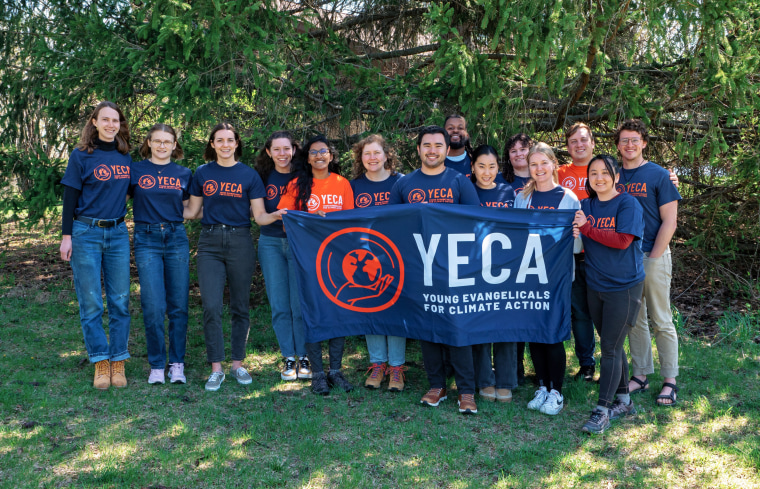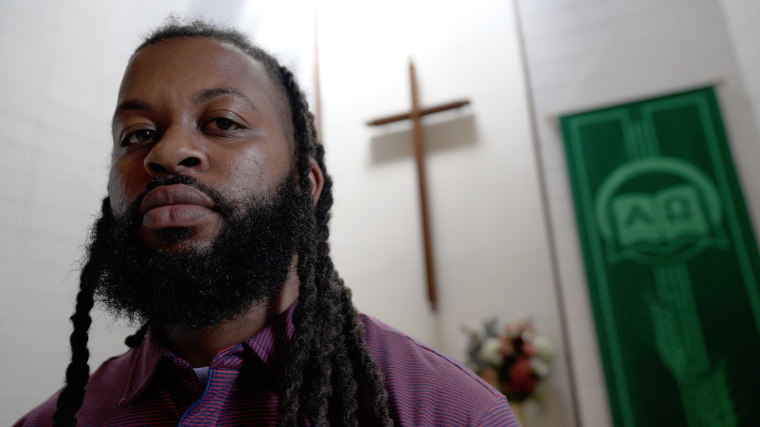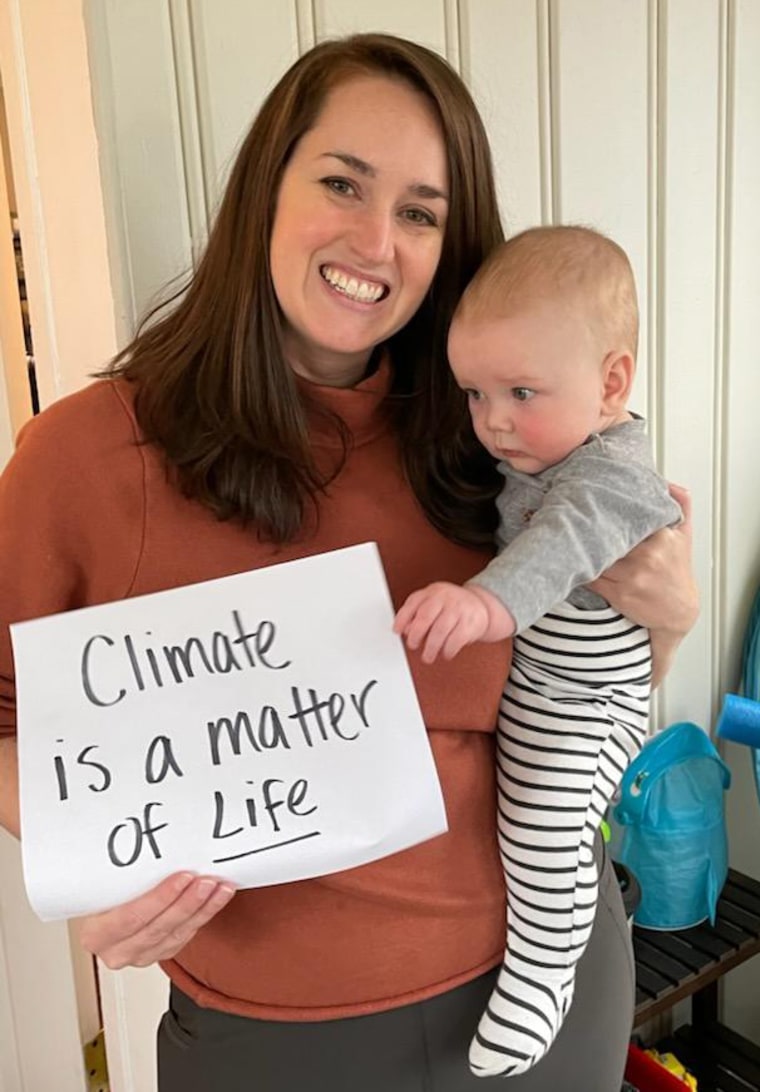overview
- A group of young evangelical Christians is planning a campaign at religious universities to persuade students to think about climate change at the voting booth.
- It’s part of a small movement within the evangelical community to link Christian values with climate action.
- The effort comes as President Donald Trump continues to court evangelical voters while calling climate change a “fraud.”
When an evangelical student group calls for a vote on climate change at a Christian university later this month, they plan to carry the tagline: “Love God, love your neighbor, vote for climate change!”
This is the first time the bipartisan group Young Evangelicals for Climate Action has organized such an in-person campaign on campus since its inception in 2012.
The volunteers, members of six Christian university chapters, are working to connect communities affected by the climate crisis with the Christian duty to “love our neighbor” and help those in need. We are aiming for
The effort is part of a larger movement led by the Evangelical Environmental Network, a faith-based organization calling for climate action.
A 2022 Pew Research Center poll found that among U.S. religious groups, evangelical Christians are the most likely to express skepticism about human-induced climate change.
In the 2020 election, 84% of white evangelical Christians voted for Donald Trump. Donald Trump has said in the past that climate change is a “hoax” and violates decades of scientific consensus. Just last week, President Trump falsely claimed that “the Earth has actually gotten a little colder lately,” and at a September 29 rally called climate change “one of the biggest frauds in history.”
White evangelical voters cast a third of their winning votes for Trump in 2016, and a Pew Research poll released last month found 82% said they would do so again this year.
Still, Jessica Morman, CEO of the Evangelical Environmental Network, says she’s working to get Christians to see climate change as an issue that loves God’s planet.
“As evangelicals, we have a biblical mission to care for God’s creation,” said Morman, a pastor and climate scientist. “And in the 21st century, that means taking action on the climate.”
Morman said he has seen increased interest in climate issues among evangelicals who have experienced extreme weather. That’s why her group is starting to focus on uncovering the connections between climate change and increasingly powerful storms and wildfires, she said.

Young Evangelicals for Climate Action is a division of the Evangelical Environment Network, and its work extends beyond college campuses. Adam Hubert, a middle school science teacher at a faith-based school called Hope Academy GSO in Greensboro, North Carolina, is also a member. He incorporates climate science into middle school biology and environmental science classes.
This spring, the class traveled to the Blue Ridge Mountains to learn about how climate change can affect forests and wildlife.
Hubert said many students say school is the only place they talk about climate change.
“I hope my students leave the classroom with some kind of respect for the natural world,” he said. “So when they turn 18 and go to the ballot box or talk to their neighbors, they might think about that.”

Most of Hope Academy’s 130 students come from low-income families of color. Hubert said the climate change denial rhetoric from some prominent evangelicals is not representative of the attitudes of the school community.
“I believe that white evangelicals have the ability to deny that something doesn’t exist or pretend that something doesn’t exist,” he said. “I think you see it in racial injustice. I think you saw it in the pandemic. And you certainly see it in the climate crisis.”
Moman sees climate change denialism among evangelical Christians as a product of misinformation.
“Unfortunately, one of the primary targets of that misinformation was my own evangelical community,” she said.
Some conservative evangelical politicians have long stoked climate change skepticism. Ten years ago, the late Jim Inhofe, a Republican senator from Oklahoma, presented a snowball on the Senate floor as proof that only God can change the climate. And last year, former Arkansas Gov. Mike Huckabee published a Christian children’s book denying man-made global warming.
To counter such ideas, the Evangelical Environmental Network is hosting webinars on how climate change science and faith connect to climate action. Volunteers run faith-based nature camps for children and facilitate listening sessions in Christian communities affected by the climate crisis.
The group’s foundation, the Pro-Life Clean Energy Campaign, is based on research showing that air pollution can increase the risk of premature birth and low birth weight babies, and calls for reducing air pollution as a way to protect unborn babies. This serves as a framework for promoting initiatives. A petition associated with the campaign has received over 2 million signatures.
The network also connects with pastors and preachers to provide guidance on incorporating climate discussions into their sermons.
Caleb Haynes, pastor of a small church called Kaleo Nashville in Nashville, Tennessee, is also a member of the network. He believes it is the duty of Christians to consider the climate when voting, and preaches accordingly.
“It’s 2024. Christians aren’t the only ones talking about the end times,” he told the congregation during a Sunday morning service in July. “As glaciers melt, sea levels rise, and greed seeks to take control, God’s people must emerge.”
Haines does not endorse any particular candidate, instead focusing on the connection between Christian teachings and caring for the planet.
“Some pastors get tired of talking about climate change, but for me it’s Biblical faithfulness 101,” he said in an interview. “Our original sin here was to eat whatever we wanted, in any way we wanted, from whatever tree we had in our garden, and to assume that there would be no consequences.”
“We are talking about the future of life on Earth and the lives of millions of people,” he added.

Haines and Morman said they see climate change as an issue of caring for children.
“As evangelicals, we are called to protect the life of each child,” Morman said. “And to really make that happen, we have to take climate into account, because the people most affected by climate damage are our children, both born and unborn.”
Mr. Trump has been able to attract the votes of evangelicals in his campaign by speaking at Christian-related conferences, and has achieved some success. At a campaign rally in Ohio in March, Trump voters were seen wearing costumes emblazoned with the slogan “Jesus is my savior, Trump is my president.” At President Trump’s rally in Montana in August, several evangelical attendees said they viewed the failed assassination attempt as “divine intervention.”
Despite this, Morman said he believes evangelicals remain an important untapped voter base in tackling climate change.
“We have activated only a small portion of the population,” she says. “To solve big problems like climate change, we need everyone.”
#Evangelical #environmentalists #call #vote #climate #change #election #approaches #Care #Gods #creation